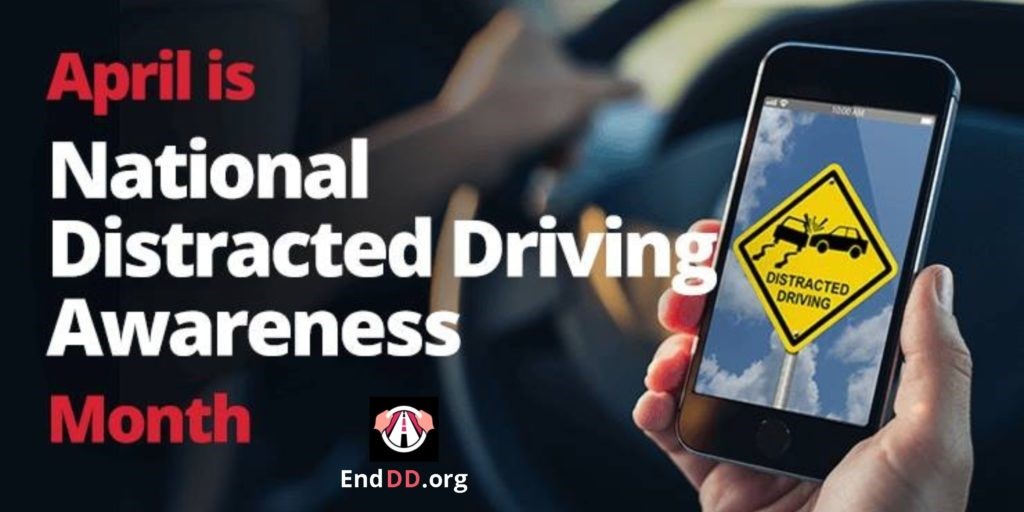April is Distracted Driving Awareness Month!
Did you know your brain can miss seeing up to 50% of your driving environment when you talk on a cell phone? And that according to research, drivers talking on cell phones had slower reaction times than drivers with a .08 blood alcohol content. April is Distracted Driving Awareness Month and is the perfect time for motor carriers to reinforce to their drivers the dangers of distracted driving and the rules and regulations being enforced by the FMCSA.
According to these regulations, Commercial Motor Vehicle (CMV) drivers are prohibited from texting or using hand-held mobile phones while operating their vehicles. Violations can result in fines and/or disqualifications and will impact a motor carrier’s and/or driver’s Safety Management System (SMS) results. Texting means manually entering alphanumeric text into, or reading text from, an electronic device. The rules also restrict a CMV driver from reaching for or holding a mobile phone to conduct voice communication, as well as dialing by pressing more than a single button. CMV drivers who use a mobile phone while driving can only operate a hands-free phone located in proximity. In short, the rule prohibits unsafely reaching for a device, holding a mobile phone, or pressing multiple buttons.
The rules impose sanctions for driver offenses, including civil penalties up to $2,750 and disqualification for multiple offenses. Motor carriers are also prohibited from requiring or allowing their drivers to text or use a hand-held mobile phone while driving and may be subject to civil penalties up to $11,000. Violations will impact SMS results.
This month reinforce to your drivers the dangers of distracted driving.
It’s very easy to comply with the rules: No REACHING No HOLDING No DIALING No TEXTING No READING
Banning Distracted Driving: An Employer's Guide to Protect Employees and Liability
- Implement a clear policy indicating that the employer does not require employees to answer calls while they are on the road. This includes the employer placing calls to employees while they are driving.
- Encourage your employees to plan their trips to include stops so they can safely return calls and emails.
- Establish a company policy that makes it unnecessary for employees to text while driving to fulfill their job duties.
- Eliminate any incentives that may encourage employees to text/talk while operating a vehicle.
- Communicate your state's regulations and associated fines to employees.
- Encourage employees to sign an anti-distracted driving pledge.
- Designate company vehicles as "distraction-free zones."
For additional information on distracted driving click here
FMCSA Deletes Requirement for Drivers to Submit Annual Record of Violations (Certification of Violations)
For Interstate carriers, the Federal Motor Carrier Safety Administration has issued a final rule eliminating the requirement that drivers operating commercial motor vehicles in interstate commerce prepare and submit a list of their convictions for traffic violations to their employers annually. The agency explained this requirement largely duplicates a separate rule that requires each motor carrier to make an annual inquiry to obtain the motor vehicle record for each driver it employs from every State in which the driver holds or has held a CMV operator’s license or permit in the past year.
The change in the requirements becomes effective May 9, 2022. In addition, for a driver who is licensed by a foreign authority rather than by a State, the FMCSA amended the regulations to provide that motor carriers must make an annual inquiry to each driver’s licensing authority where a driver holds or has held a CMV operator’s license or permit.
At least every 12 months, the motor carrier must review the driving record of each driver, including compliance with the Federal Motor Carrier Safety Regulations and the Hazardous Materials Regulations. This means doing the review on or before the same date next year.
This review used to be a 3-part process. First, you would have the driver certify the previous 12 months of driving violations. Then you would check their records for any violations, one of which should be the appropriate state motor vehicle record. Finally, you then certify as the carrier whether the driver is qualified or not to continue driving.
As of May 9, 2022, FMCSA has removed the requirement that the driver certifies a list of convictions for the prior 12 months. So all you will need to do is pull the MVR, review it, and complete the review certification for the driver’s qualification file.
You may use third-party companies to do the MVR checks. You can pull the MVR yourself or you can have the driver obtain his or her own MVR, which is often the easiest way to comply. In reviewing each driver’s record for the preceding year, attention should be given to any accidents and indications of violations of motor vehicle laws and regulations. Of particular importance are violations indicating a disregard for the safety of the public, such as speeding or operating a vehicle while under the influence of alcohol or drugs.
The reviewer’s evaluation of the record should determine whether the driver remains qualified or is disqualified to drive a motor vehicle under the provisions of 49 CFR §391.15 for such infractions as operating a vehicle while under the influence of alcohol or drugs, leaving the scene of an accident involving personal injury or death, etc.
A written record, including the date and the name of the person who reviewed the driving record, must be placed in the driver’s qualification file. This review must be maintained in the driver qualification file for three years after the carrier certification date.










